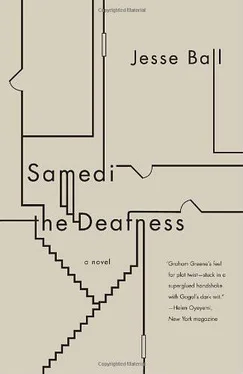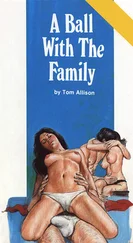Jesse Ball - Samedi the Deafness
Здесь есть возможность читать онлайн «Jesse Ball - Samedi the Deafness» весь текст электронной книги совершенно бесплатно (целиком полную версию без сокращений). В некоторых случаях можно слушать аудио, скачать через торрент в формате fb2 и присутствует краткое содержание. Год выпуска: 2007, Издательство: Vintage, Жанр: Современная проза, на английском языке. Описание произведения, (предисловие) а так же отзывы посетителей доступны на портале библиотеки ЛибКат.
- Название:Samedi the Deafness
- Автор:
- Издательство:Vintage
- Жанр:
- Год:2007
- ISBN:нет данных
- Рейтинг книги:5 / 5. Голосов: 1
-
Избранное:Добавить в избранное
- Отзывы:
-
Ваша оценка:
- 100
- 1
- 2
- 3
- 4
- 5
Samedi the Deafness: краткое содержание, описание и аннотация
Предлагаем к чтению аннотацию, описание, краткое содержание или предисловие (зависит от того, что написал сам автор книги «Samedi the Deafness»). Если вы не нашли необходимую информацию о книге — напишите в комментариях, мы постараемся отыскать её.
Samedi the Deafness — читать онлайн бесплатно полную книгу (весь текст) целиком
Ниже представлен текст книги, разбитый по страницам. Система сохранения места последней прочитанной страницы, позволяет с удобством читать онлайн бесплатно книгу «Samedi the Deafness», без необходимости каждый раз заново искать на чём Вы остановились. Поставьте закладку, и сможете в любой момент перейти на страницу, на которой закончили чтение.
Интервал:
Закладка:
The first man was standing behind James's chair. It was an awful habit, very rude, thought James.
Five minutes passed.
— Where are we? said James to his captor.
The man said nothing.
Five minutes more went by. The door creaked, and opened. Thomas McHale entered, dressed neatly in an expensive-looking suit.
James could not hide his shock.
— I see, said Thomas McHale. You have met my brother, haven't you?
He laughed. The man behind James laughed also.
— Torquin, said Thomas, you can go now. I'll keep an eye on him.
Torquin, thought James. The other Thomas McHale had said that name. Could they really be brothers? Twin brothers? The odds were against it. But certainly it was the only solution. A man could not die so convincingly and then stand again before one in such a bold and shameless way.
Thomas McHale shut the door after Torquin, and then turned to face James.
— You've met my brother, then, he repeated. Did you like him? No, no, I guess there wasn't time for you to meet properly, was there? Very sad, what happened. Do you know the story? I'm sure he told you something.
— If you're going to do to me what you did to him, you might as well do it now. I don't like waiting around for nothing.
— Hmmm, said Thomas McHale. What we did? What I did? Hmmm. I wonder what he did tell you. . Do you know, do you know my brother had gone quite insane? Thought he was in the middle of a spy novel, really. The strangest thing. Nothing could convince him otherwise. I didn't want him in an institution, of course, frightful places, so I kept him here. But then he escaped. Persecution mania. He told everyone we were against him. Then before I can find him again, he gets mugged, assaulted, and dies. We had his funeral just yesterday up at Mount Auburn.
James tried to follow this line of thought. Had the first Thomas McHale been mad? He had been right about where Estrainger lived. Or, at least, he had known that a man named Estrainger did indeed live near the Chinese district, and was indeed a playwright.
Suddenly, McHale's information seemed less and less sure.
— Then why the mask? burst out James. Why send me the mask?
— The mask, yes, said McHale, tapping a letter against his sleeved arm. The mask, yes. . well, that was a sort of mistake, really. You know, Grieve, she's an odd one. Her father likes to give her little jobs to do. She's quite a case. Lies about everything. Can't help it.
— What? said James. She said her name was Lily Violet.
— Of course she did, said McHale. Yes, well, it was said that someone had spoken to my brother before he died. The police said someone had been there, but they couldn't figure out who. We managed to speak to someone who'd seen you there, and Grieve's father sent her to ask you what it was Thomas said. All of us here, of course, are very interested to know what his last words were. My dear brother. .
McHale said this with real feeling.
James desperately tried to clear his head.
— None of this makes any sense. Why did Lily Violet—
— Grieve, interposed McHale.
— Grieve, continued James. Why did Grieve steal my wallet, why did she send me a strange mask, and why did she come to my house to spy on me?
— She came to your house? said McHale. Interesting. We didn't know that. She did slip her minder yesterday and go off into the city. We weren't sure where she went. Well, he said, that's one mystery solved.
He examined James closely, pulled another chair over, and sat beside him.
— The truth is, she took your wallet because she is a very good pickpocket, and we were interested to know about who you were. She had been instructed to simply ask you, but that's not her way.
James nodded, following along.
— As for the mask, well, she must have taken photographs of you, and then taken them to a mask factory. I can't imagine how that sort of thing could be done so fast, but evidently it was. . What can I say, she's an odd sort of girl. If not for the watch her father keeps on her, she'd have gotten into a lot of trouble a long time ago. I can tell you that much.
There was a knock at the door. McHale rose.
— Yes, he said peremptorily. Come in.
The door opened. A young woman dressed as a maid stood there, holding a tray.
— Bring that over here, said James.
She did so, setting the tray upon a table close by James's elbow.
— Of course, said McHale, we became even more interested in you after the death in Estrainger's building. You were there looking for Estrainger, were you not?
He took something out of his pocket and unfolded it. It was the napkin James had had at the diner.
What should be done?
nothing
tell someone, the police.
— Were you thinking of telling the police the story McHale told you? You wouldn't be the first to go to them. Before he ran into those muggers, my brother spoke to at least four people, and convinced them all to go to the police. They all did, every one, each with the same story. He was away from this house for four days. Don't you think it's strange that he didn't go to the police?
— I don't know what to think, said James. It's all rather strange to me.
— Yes, well, think through what he said. We know your profession. Of course, you can tell us exactly how his last minutes passed. We would very much like to have that information, as all of us here miss him deeply.
James nodded.
— Should I write it out?
— Yes, that would be preferable.
McHale pointed to the tray. On it there was a metal bell, the sort for concealing cakes and such.
— That's the key to your room, said McHale. We'd like to extend an invitation to you to stay here a few days. There are many of us who live here, many who knew my brother intimately. Some of us would like, I'm sure, the chance to speak to you personally, as you were the last one to see him alive. We have here a very fine chef, and a staff that is quite accommodating. Anything you want can be seen to. There are, however, a great many rules that govern our life in this house. When you get up to your room there is a little book where they're written. We ask that you observe them while you're here. You see, there are patients, many of them, and staff as well, and then there are those of us who live here on a rather different basis. Everyone here observes the rules, save Grieve, of course. She can be difficult, as you've learned.
McHale noticed James's puzzled expression.
— This is a verisylum. There was only ever one before this, built in 1847. We believe it is the only real treatment for dramatic cases of chronic lying, cases where the lying ends up compromising the identity of the individual. Instead of giving medications, or applying truth-rubrics, Margret Selm came up with her own method. She established the parameters for the creation of a country house in which all behavior would be governed by a set of arbitrary rules. There would be no prohibition against lying, but the individuals present in the house, the chronic liars, would find in the arbitrary rules, which, as you'll come to see, are many, a sort of structure that allowed them, as time passed, to construct an identity for themselves. The idea is that when many lies are told, unfettered by immediate comparison to fact, they end up comprising a kind of truth. On that truth too lies can be based.
This was all a bit too much for James, who after all had just been abducted for the first time in his life, abducted and carried away in a car.
— Then I can go up to my room now? he said. I can go where I like? And leave when I like?
— We ask that you stay here for the next few days, just so you're around to speak to our little circle of intimates. It would mean so much to us. .
Читать дальшеИнтервал:
Закладка:
Похожие книги на «Samedi the Deafness»
Представляем Вашему вниманию похожие книги на «Samedi the Deafness» списком для выбора. Мы отобрали схожую по названию и смыслу литературу в надежде предоставить читателям больше вариантов отыскать новые, интересные, ещё непрочитанные произведения.
Обсуждение, отзывы о книге «Samedi the Deafness» и просто собственные мнения читателей. Оставьте ваши комментарии, напишите, что Вы думаете о произведении, его смысле или главных героях. Укажите что конкретно понравилось, а что нет, и почему Вы так считаете.












